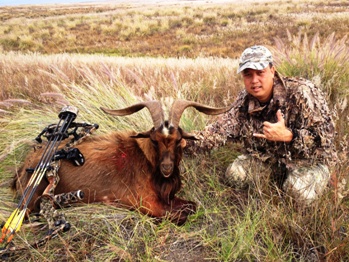28th Annual Event Recognizes Hunter Contributions
The contributions of fishers and hunters to conservation were again recognized nationally and in Hawai‘i during National Hunting and Fishing Day events. This was Hawai‘i’s 28th year of recognizing the event and for the first-time activities were scheduled over two separate weekends.

Lloyd Rubio is shown with a goat he shot hunting in the Saddle Road area on Nov. 17. Photo courtesy of US Army Garrison Pohakuloa.
On Sept. 8, 2018, a National Hunting and Fishing Day Archery Fun Day was held at the Kapolei “Bushwackers” Archery Range. The fun day included a 3-D archery target field course, vendor demo day, and archery games.
On Sunday, Sept. 16, 2018, hundreds of adults and keiki participated in a National Hunting and Fishing Day Range Day at the Koko Head Shooting Complex in east O‘ahu. Both events offered free admission and for every dollar or pound of canned food that participants donated to the Hawai‘i Food Bank, they received a coupon for activities like trap (shotgun) shooting, .22 rifle and handgun, high power rifles and cowboy action shooting.
Andrew Choy, Hunter Education Program manager said, “We changed it up this year to provide a more stratified sequence of activities, in a safe and welcoming environment, that only provided more hands-on activities for families but also welcomed a wider range of participants with varying degrees of interest in the field.”
Numerous partners had informational booths at the event, including the DLNR Division of Aquatic Resources (DAR) which provided information about fishing opportunities in Hawai‘i.
National Hunting and Fishing Day began in 1972 as a way for states to celebrate the ongoing contributions of sportsmen and women to wildlife and sport fish conservation and education efforts.
Over $1.1 billion of federal funding were made available to states in 2018 for wildlife and sport fish restoration programs. More than $8.3 million was made available to Hawai‘i. The Pittman-Robertson (1937) and Dingell-Johnson (1950) Acts administered through the U.S. Fish and Wildlife Service’s Wildlife and Sport Fish Restoration Program provides the funding. Revenue from taxes administered through these Acts goes right back into state wildlife agencies, like the Department of Land and Natural Resources, for wildlife and sport fish restoration projects, education and shooting range development.
Sponsored Content
Comments





_1770333123096.webp)


